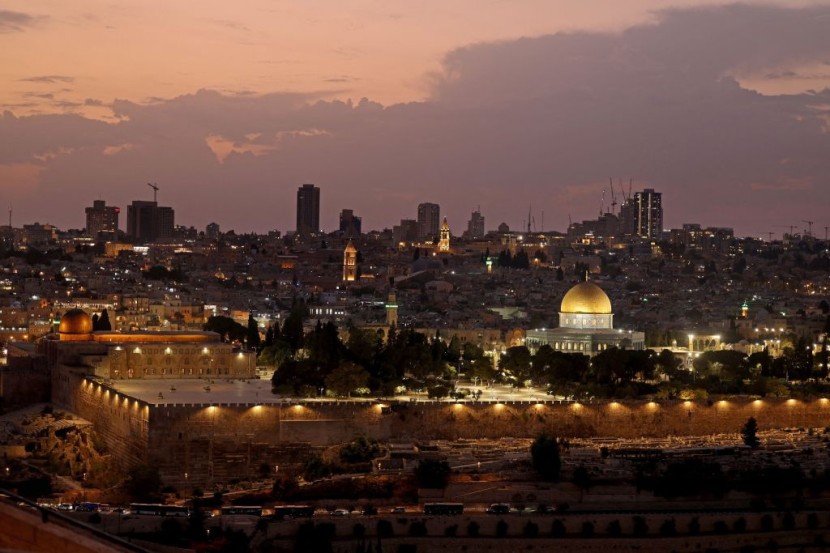Jerusalem's deputy mayor Fleur Hassan-Nahoum recently outlined a new vision for the holy city along with the Palestinians and Israeli Arabs whom she argues were increasingly growing disillusioned with a binary choice between rival leaderships in Gaza and the West Bank.
In an exclusive interview with Newsweek, Hassan-Nahoum said that a city that was "normally the hotbed of the conflict has become a city of refuge" for Israelis fleeing active war zones across the nation.
With the consequences of the war between Israel and Hamas, she has argued for a future in which Jerusalem would serve as a haven for both Jews and Israeli Arabs who reject Hamas, as well as the secular Palestinian National Authority faced with its own challenges in the West Bank.
"If you were to tell me what has changed in Jerusalem in the last 10 years, I would say that there has been a rapprochement between Jews and Arabs," she said. "We're in the same cafes, we're in the same parks. There's more Arab young men and women in universities than ever."
Hassan-Nahoum added that some of the Palestinians and Arab Israelis have eventually realized that their salvation was "not going to come from the Palestinian leadership" and that they would rather "take advantage of the opportunities" of a free country like Israel and a city like Jerusalem, to bring opportunity and prosperity to their own people.
Hassan-Nahoum Stresses 'Third Option' for Palestinians, Arabs
Hassan-Nahoum added that a third option was needed for Palestinians aside from Hamas, which has been running Gaza, and Fatah, which has control of the West Bank as the Palestinian Liberation Organization (PLO).
"I think Israel and the West need to foster and empower the leaders that have shown we can do business with them," she said. "Those are the people who should be dealing with the Palestinian people."
However, she reckoned that the Arab world was not ready for a democracy, as democratic rule would only "empower the Muslim Brotherhood and Hamas."
The vision of a democratic Arab world and its accompanying narrative remain deeply controversial among segments of Arab and Palestinian communities aspiring for an independent path to establishing an internationally recognized sovereign Arab state, of which East Jerusalem, is internationally recognized as part of the West Bank but administered by Israel, as its capital.
Read also: Israel-Hamas Ceasefire: Israeli Leaders to Halt Pursuit, Terrorist Leaders to Release Hostages

Sleeper Cells and False Flags
The plan was also being challenged by the cultural significance of Jerusalem and the active threat of unrest breaking out in a city that has been sitting for too long on the frontlines. The most recent of which was the false flag attempt of gunmen affiliated with Hamas, where six people were injured and all three gunmen were neutralized at the scene.
Hassan-Nahoum further acknowledged that such incidents, along with the presence of alleged "sleeper cells of Islamic groups in Jerusalem," represented a concern, but she also believed the situation was still trending toward stability.
"Every Friday, my heart is in my throat, 'Let's see what's going to happen with Friday prayers,'" she added. "And every Friday I breathe a sigh of relief at 2:30 in the afternoon when nothing has happened, so far."
The constant mindset of hostility, she argued, was the product of a toxic educational system that was "inciting against Israel," as well as of frustrations over a "corrupt leadership in the West Bank."
Palestinian Response, Counter-Proposal
In response to Hassan-Nahoum's pronouncements, the PLO's Department of Jerusalem Affairs told Newsweek that it was Israel has disrupted Palestinian democracy, arguing that the Palestinian elections, which were "held more than once over three decades," were "national experiences in which democracy was demonstrated in all its aspects."
"Jerusalemites exercised their Palestinian affiliation by participating in the Palestinian elections in 1996, 2005 and 2006," the department added.
However, Israel allegedly refused to allow the presidential and legislative elections scheduled for 2022 to be held in Jerusalem or for Jerusalemites to participate in them.
Meanwhile, PLO Executive Committee member Faisal Aranki said that Israel's own democracy "brought to them a hideous racist right-wing government" practicing the "worst types of persecution, pain, and oppression."
However, the Palestinian National Authority under Mahmoud Abbas has been constantly facing a historic crisis of support and popular legitimacy even before the current war between Israel and Hamas.
Related Article : Hamas Claims 4-Day Truce With Israel Will Start Nov. 23








